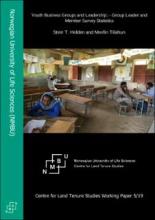Land Library
Welcome to the Land Portal Library. Explore our vast collection of open-access resources (over 74,000) including reports, journal articles, research papers, peer-reviewed publications, legal documents, videos and much more.
/ library resources
Showing items 1 through 9 of 16.The importance of land manifests in various components of the everyday lives of people insocieties: cultural heritage, livelihood, the environment, economy, and community, among manyothers. Land is a factor of development.
The failure of rural economies to deliver decent work to their young people affects national economies, threatens political stability, nurtures extremism and causes socially and economically disruptive migration. Globally, youth are two to three times more likely than adults to be unemployed.
The food system challenges require simultaneous action across different sectors and concerted efforts of diverse players in food systems.
Continued strong population growth in already densely populated rural areas in parts of Sub-Saharan Africa makes it harder for youth to choose agriculture as their main source of income. We investigate whether near landless youth still can access rented land as a complementary source of income.
We study how social preferences and norms of reciprocity are related to generalized and particularized trust among members of youth business groups in northern Ethiopia. Members of these groups are recruited among land-poor rural youth.
This working paper is an output from the research project “Youth Business Groups for Sustainable Development: Lessons from the Ethiopian Model” that is funded by Research Council of Norway under the NORGLOBAL2 research program for the period 2019-2022.
This working paper is an output from the research project “Youth Business Groups for Sustainable Development: Lessons from the Ethiopian Model” that is funded by Research Council of Norway under the NORGLOBAL2 research program for the period 2019-2022.
This paper examines the intersections between youth access to land, migration decisions and employment opportunities using nationally representative and multi-year data from multiple African countries.
A narrative on rural youth in Africa has continued to evolve in policy circles around the world. Much of it is driven by population statistics that point to an imminent youth bulge in Africa and concerns about a poor economic outlook (stagnation) for African productivity and growth.





